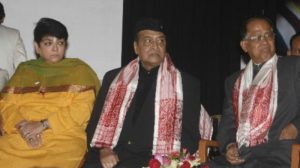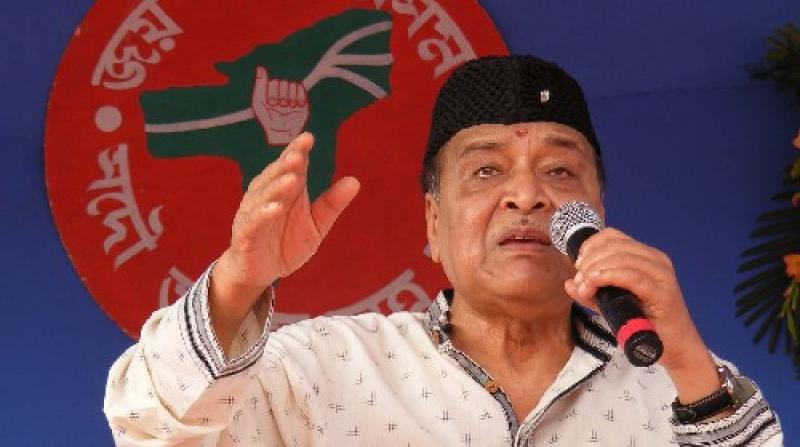Remembering Bhupen Hazarika: The Bard of the Brahmaputra
“On a rainy April evening in 1998, the crowd swelled under a Bihu pandal in Guwahati’s Dispur capital complex. The downpour was doing little to dampen the spirits of the gathering, with some holding umbrellas under the leaking makeshift structure.
Others waded through the slushy ground to get a closer look of the stage,” 67-year-old Shanisa Rajkumari, who was present at the concert, recollects while talking to Media India Group.
The reason for the concerted efforts to brave the elements became clear soon as minutes later, Bhupen Hazarika arrived, wearing his trademark Gorkha topi, a black kurta and pyjama. Another few seconds and his baritone voice rang out: “Manuhe manuhor babe, Jodihe okonu nabhabe; Okonu xohanubhutire, habibo kunenu kua?” (If humans wouldn’t think for humans with a little sympathy, tell me who will, my friend?)
One of the most famous cultural icons of north-eastern India, Hazarika wore many hats. He was a singer, lyricist, activist, filmmaker and a poet who brought the region together, across physical and emotional barriers. His songs not only stirred nationalism during the gloomy days of linguistic riots and ethnic conflicts in the state — starting from the 1960s – but also inspired the United Liberation Front of Assam (ULFA), which sought Assam’s secession from India.
Popularly known as Sudhakantha, Hazarika was born in Sadiya, Assam in 1926 to Nilakanta and Shantipriya Hazarika and was the eldest of their 10 children. Known for his flawless baritone, he was respected nationwide, as a great balladeer and also came to be known as the ‘Bard of the Brahmaputra’.
Hazarika also penned songs on themes of humanity and communal harmony which, although written and sung in Assamese, had a universal appeal. Each had a message enveloped in them, functioning as an instrument that held a mirror in front of society. While songs like Manuhhe Manuhor Babe (Humans are for humanity), questioned whether humanity existed in society; another iconic creation, Ganga Boicho Keno (O Ganges, why do you flow?), rebuked the beautiful river flowing quietly, in spite of bearing witness to the cruelty around it.
“With a musical career this vast, Hazarika’s academic achievements are seldom discussed. But it was at Columbia University, where he had gone to do his PhD, that he had befriended American civil rights activist Paul Robeson. This was to be one of his most life-changing experiences. With Robeson, Hazarika realized the importance of incorporating folk music into protest songs,” says Anupam Kant, a film critic from Delhi.

Hazarika came back from the US & joined the Indian People’s Theatre Association (IPTA), a leftist theatre group in 1950
“Robeson’s ‘Ol man river’ resonates years later in Hazarika’s masterpiece Bistirno parore (Of the wide shores). The Bengali and Hindi versions, ‘Ganga behti ho kyu’ (O Ganga, why do you flow?), of this song are no less popular. A few years ago, a Nepali rendition of the song ‘Bristrit Kinarako’ (On your wide mighty banks) became the voice of the Gorkhaland agitation,” he adds.
Hazarika came back from the US and joined the Indian People’s Theatre Association (IPTA), a leftist theatre group, in the 1950s. He wrote songs such as ‘Parashi Puwate Tulunga Nawote’ that tells the plight of a fisherman who goes out to the sea and drowns and ‘Dola he Dole’, which talks about palanquin bearers.
Political scientist Sanjib Baruah, in his book India Against Itself, explains how Hazarika rewrote one of Lakshminath Bezbaroa’s (one of the pioneers of Assamese literature) poems in 1968 to reflect the political mood of the time — the fears of cultural colonialism in the wake of illegal immigration.
“Hazarika’s brand of nationalism, however, was bound by humanism and did not let it stray into jingoism unlike the state of nationalism right now,” says Kant. The 1980s saw him voicing and mobilising mass support for the Assam Movement. In his song, Aai o aai, Hazarika laments the breakup of Assam into seven states. His songs had healed people but Assam remained fragmented – both culturally and politically.
In an interview, Hazarika recalls a phone conversation he had with ULFA chief Paresh Baruah and says “He (Paresh) asked about the new song I had written. I told him that I still had to set it to tune. The song means ‘If our destination is sunrise, why are you running towards the sunset’. All I said was that I want peace”.
In addition to his historic songs and music, Hazarika also made a gamut of films like Era Bator Sur (1956), Mon Prajapati (1979), Swikarokti (1986) and Chingaari (2006). For his mammoth body of work and contribution to Indian cinema, he received the National Film Award for Best Music Direction (1975), Padmashri (1997), Padmabhushan (2001), and posthumously, the Padma Vibhushan (2012), among other awards.
He was also the recipient of Sangeet Natak Akademi Award (1987), as well as the Dada Saheb Phalke Award (1992). Eight years after succumbing to multiple organ failure on November 5, 2011, Hazarika was posthumously awarded the Bharat Ratna in 2019.










